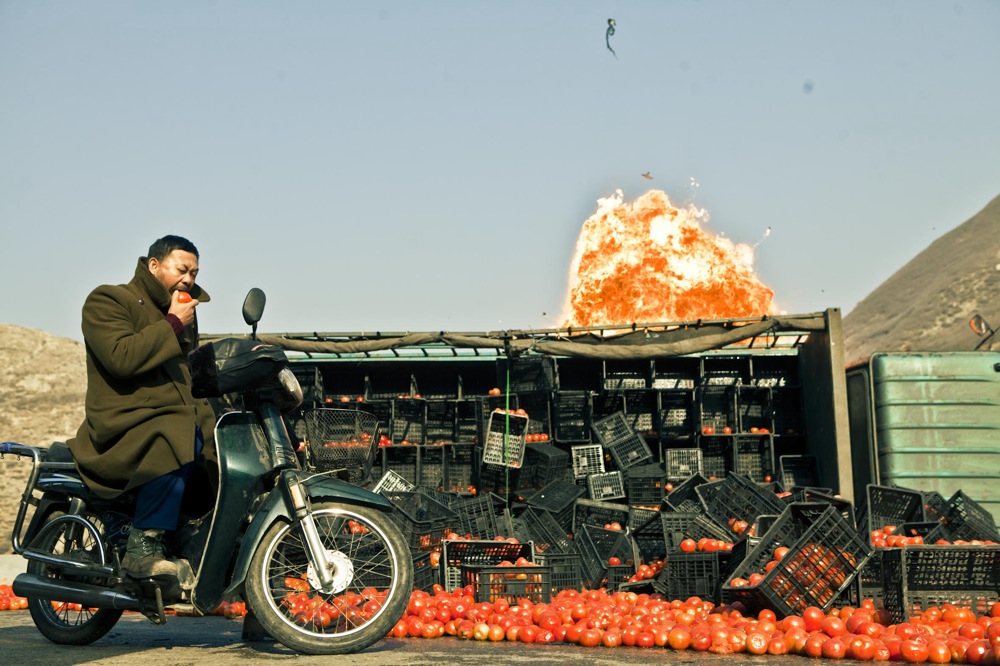Movie review: ‘A Touch of Sin’

By Tony Huang
Oct. 10, 2013 12:39 a.m.
The original version of this article contained an error and has been changed. See the bottom of the article for additional information.
“A Touch of Sin”
Directed by Jia Zhangke
Kino Lorber
3.5 Paws
There are many purposes by which filmmakers approach murder, some better than others. In “A Touch of Sin,” there is only one real purpose: because nothing else feels right.
Labeled as a contemporary wuxia (martial arts) picture, “A Touch of Sin” is at first somewhat of a departure for Chinese director Jia Zhangke. Long esteemed as the most important Chinese filmmaker, Jia is known for his vivid portrayals of Chinese urbanization.
Whereas Jia’s past films tended to focus on sympathetic but passive characters enduring the near-inhuman force of progress, his latest lets them fight back, borrowing a mythic style from kung-fu movies to punctuate decisions of mortality. Yet Jia is never tempted by the pleasures of this focus – never does the film feel like a victory lap for his characters. Violence is not the answer; rather, it is the question, a symptom, and Jia does not shy away from answers. “A Touch of Sin” is a blunt, brutal and impassioned diagnosis of contemporary China’s primary problem – capitalism.
“A Touch of Sin” follows a series of characters as they struggle against the economic pressures of their environment, inevitably becoming killers. Dahai (Jiang Wu) is a sick man disgruntled by the corruption of his village government; Zhou San (Baoqiang Wang) is nihilism incarnate, and performs the first three killings of the movie with spectacular apathy; Xiao Yu (Zhao Tao) struggles with an affair with a married man; Xiao Hui (Luo Lanshan) works at a sex shop and falls in love with one of the girls.
Dahai’s segment, which opens the film, provides a thematic foundation for elaboration in the rest of the film. Prominently featured on the film’s posters with his rifle wrapped in a tiger emblem, Dahai is first seen as a heroic archetype, chewing fruit on a motorcycle.
But the film has a complicated view of this character: His demeanor is awkward and his paranoia verges on insanity. When he kills, the psychology behind the act is ambiguous. He does not kill solely for hatred. Society seems to have oppressed him to the brink of insanity, and killing is all he has left. The craziest part of this sequence is that it’s easy to identify with Dahai.
The three following tales offer subtler variations on this insanity, but Jia makes sure no one misses the point, laying on thick visual metaphors. For all of its didactic moments, the film never seems overwhelmed by its sociological relevance – character psychology remains accessible even as the world around the characters fits neatly into Jia’s statement.
It helps, too, that his talent as an image maker is nearly unsurpassed, composing his super subtext images with a force of vision that seems to void the need for further elucidation. In particular, a soft focus close-up of Zhao Tao, with the blurred lights of a departing train in the background, is so beautiful it’s overwhelming, even without the melancholy of the scene’s plot function.
Jia’s social criticism may be the root of his importance, but it’s his keen visual sense that makes his films so enduring. “A Touch of Sin” seems to struggle with its structure, but from moment to moment there is scarcely a shot not worth the trouble, and Zhao Tao’s segment in the middle of the movie is so rigorously meaningful that it’s easy to forgive the movie’s rhythmic tumbles.
It becomes even easier to forgive the movie’s shortcomings after the credits run, as it becomes clearer that every step of the way, the film was supporting a disturbing and depressing statement: that this was never a character study of four violent and crazed individuals.
As the last, disorienting shot of the movie implies, it was all along a study of a society that perpetuates violent rage among seemingly normal, everyday people. As the emperor says in the last line of the movie, “Do you know that you have sinned?”
Correction: Jia Zhangke’s family name is Jia.

